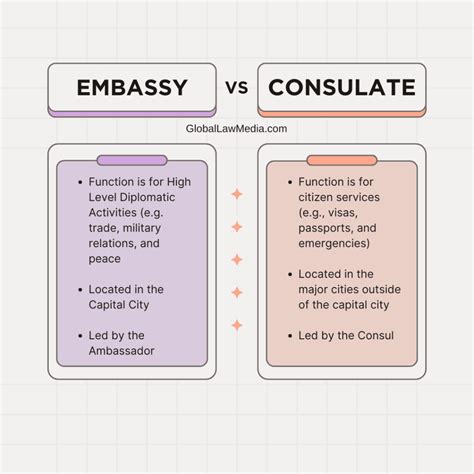Is A Consulate The Same As An Embassy

When it comes to diplomatic missions, many people often wonder if a consulate is the same as an embassy. While both terms are related to international relations and diplomatic representation, they serve distinct purposes and have different roles. In this article, we will delve into the differences between a consulate and an embassy, exploring their functions, responsibilities, and significance in the world of diplomacy.
Understanding Embassies

An embassy is a diplomatic mission that represents a country’s government in a foreign capital city. It is typically the official residence and workplace of the ambassador, who is the highest-ranking diplomatic representative of the sending country. The embassy is responsible for promoting the sending country’s interests, maintaining diplomatic relations with the host country, and providing various services to its citizens living or traveling abroad. These services may include issuing visas, passports, and other travel documents, as well as assisting with emergencies such as arrests, accidents, or medical emergencies.
Embassy Functions
Some of the key functions of an embassy include:
- Representing the sending country’s government and interests in the host country
- Promoting trade, investment, and cultural exchange between the two countries
- Providing assistance to citizens of the sending country, including emergency services and travel documentation
- Negotiating and signing treaties, agreements, and other diplomatic documents
- Gathering information and intelligence on the host country’s politics, economy, and society
Understanding Consulates

A consulate, on the other hand, is a diplomatic mission that represents a country’s government in a specific region or city within a foreign country. Consulates are typically located in major cities or ports, and their primary function is to provide assistance to citizens of the sending country who are living, working, or traveling in that region. Consulates may also provide services such as issuing visas, passports, and other travel documents, as well as assisting with trade and commercial activities.
Consulate Functions
Some of the key functions of a consulate include:
- Providing assistance to citizens of the sending country, including emergency services and travel documentation
- Promoting trade and commercial activities between the sending country and the host region
- Issuing visas and other travel documents to citizens of the host country
- Gathering information and intelligence on the host region’s economy, politics, and society
- Supporting cultural and educational exchanges between the sending country and the host region
Key Points
- Embassies represent a country's government in a foreign capital city, while consulates represent a country's government in a specific region or city within a foreign country
- Embassies have a broader range of functions, including promoting trade and investment, negotiating treaties, and gathering intelligence
- Consulates focus on providing assistance to citizens, promoting trade and commercial activities, and issuing visas and travel documents
- Both embassies and consulates play important roles in promoting diplomatic relations and protecting the interests of their citizens abroad
- Understanding the differences between embassies and consulates can help individuals navigate the complex world of international relations and diplomacy
Comparison of Embassies and Consulates
In summary, while both embassies and consulates are diplomatic missions that represent a country’s government abroad, they have distinct functions and responsibilities. Embassies are responsible for promoting a country’s interests, maintaining diplomatic relations, and providing a wide range of services to its citizens. Consulates, on the other hand, focus on providing assistance to citizens, promoting trade and commercial activities, and issuing visas and travel documents. By understanding the differences between these two types of diplomatic missions, individuals can better navigate the complex world of international relations and diplomacy.
| Category | Embassy | Consulate |
|---|---|---|
| Location | Foreign capital city | Specific region or city within a foreign country |
| Functions | Promoting trade and investment, negotiating treaties, gathering intelligence | Providing assistance to citizens, promoting trade and commercial activities, issuing visas and travel documents |
| Responsibilities | Representing the sending country's government and interests | Representing the sending country's government in a specific region or city |

FAQs
What is the primary function of an embassy?
+The primary function of an embassy is to represent a country’s government in a foreign capital city and promote its interests abroad.
What is the difference between a consulate and an embassy?
+A consulate represents a country’s government in a specific region or city within a foreign country, while an embassy represents a country’s government in a foreign capital city.
Can a consulate provide the same services as an embassy?
+While both embassies and consulates provide assistance to citizens, the range of services offered may vary. Consulates typically focus on providing assistance with travel documentation, trade and commercial activities, and emergency services, while embassies may offer a broader range of services, including negotiating treaties and gathering intelligence.
In conclusion, understanding the differences between embassies and consulates is essential for navigating the complex world of international relations and diplomacy. By recognizing the distinct functions and responsibilities of these two types of diplomatic missions, individuals can better appreciate the importance of diplomatic representation and the role it plays in promoting a country’s interests abroad.



